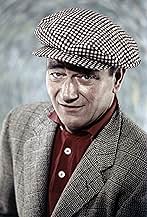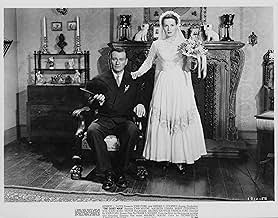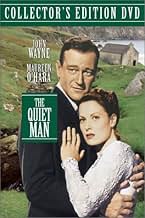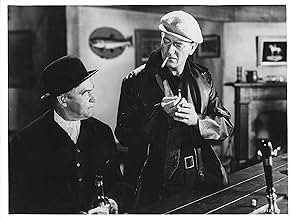Um boxeador americano aposentado volta à sua cidade natal na Irlanda, onde se apaixona por uma ruiva enérgica cujo irmão despreza a união deles.Um boxeador americano aposentado volta à sua cidade natal na Irlanda, onde se apaixona por uma ruiva enérgica cujo irmão despreza a união deles.Um boxeador americano aposentado volta à sua cidade natal na Irlanda, onde se apaixona por uma ruiva enérgica cujo irmão despreza a união deles.
- Direção
- Roteiristas
- Artistas
- Ganhou 2 Oscars
- 15 vitórias e 10 indicações no total
Charles B. Fitzsimons
- Hugh Forbes
- (as CHARLES fitzSIMONS)
James O'Hara
- Father Paul
- (as James Lilburn)
Sean McClory
- Owen Glynn
- (as Sean McGlory)
Jack MacGowran
- Ignatius Feeney
- (as Jack McGowran)
- Direção
- Roteiristas
- Elenco e equipe completos
- Produção, bilheteria e muito mais no IMDbPro
Avaliações em destaque
I like The Quiet Man so much that it features in my top three favourite films. This incidentally is alongside quite disparate films as Blade Runner and The Shawshank Redemption.
This is nothing to do with direction, acting or even location but simply because it feels so good!
Yes it is a simple story but it's amusing, very easy to watch and leaves you with a warm glow and a smile. Also the building of the "diddly diddly music" approaching the fight sequence is a delight.
That's all I need from a film that does not pretend to be anything more than a story.
This is nothing to do with direction, acting or even location but simply because it feels so good!
Yes it is a simple story but it's amusing, very easy to watch and leaves you with a warm glow and a smile. Also the building of the "diddly diddly music" approaching the fight sequence is a delight.
That's all I need from a film that does not pretend to be anything more than a story.
"The Quiet Man" is an Irish village version of "The Taming of the Shrew," the tamer being an ex-pugilist Sean Thornton (John Wayne) retired to the land of his fathers where he purchases "that little place across the brook, that humble cottage." But no sooner does he arrives on a soft spring morning than he falls in love with Mary Kate (Maureen O'Hara).
Sean courts and weds her easily enough, but he has not worked out on the anger of her heavy and hard rich brother, the farmer Will Danaher (Victor McLaglen) who holds an envy against him for having bought the very property that separates his spread from that of the wealthiest widow in Innisfree Sarah Tillane (Mildred Natwick) whom Danaher strongly desires...
Danaher refuses to supply the traditional dowry, and Mary Kate accuses Sean for his apparent cowardice in not fighting for what is rightfully theirs...
The battle that follows (considered to be the longest recorded on screen) has Sean and his strong brother-in-law engaging in a climatic fight the townsfolk have long been anticipating with effervescent...
Maureen O'Hara is totally in her element as the fiery Irish girl whether as the bare-footed attractive woman looking after a number of sheep in the meadow, or as the troubled colleen trying to explain her problem to the devoted salmon-catching Catholic priest (War Bond) or as the proud beauty whom Wayne lets fall at her brother's feet... Maureen would play Wayne's love interest in four more features ("Rio Grande," "The Wings of Eagle," "McLintock," and "Big Jake"). Their screen relationship emphasized the strength of their chemistry...
Barry Fitzerald is simply superb as Michaeleen Flynn, the village matchmaker and cart-driver who can't seem to tell anyone something without winning a black beer from them first...
With an exciting Innisfree Races along the beach, a titanic fight from the farm, across the hillside, through a haystack and into a stream, and with emerald environments and great music, John Ford's romantic comedy is a marvelous entertaining film, painted beautifully, simply told with love and humor...
With 7 Academy Award Nominations, the film earns Ford his 4th and last Oscar for Best Director establishing a record which is still unbeaten and won another Oscar for the outstanding Technicolor for Best Cinematography...
Sean courts and weds her easily enough, but he has not worked out on the anger of her heavy and hard rich brother, the farmer Will Danaher (Victor McLaglen) who holds an envy against him for having bought the very property that separates his spread from that of the wealthiest widow in Innisfree Sarah Tillane (Mildred Natwick) whom Danaher strongly desires...
Danaher refuses to supply the traditional dowry, and Mary Kate accuses Sean for his apparent cowardice in not fighting for what is rightfully theirs...
The battle that follows (considered to be the longest recorded on screen) has Sean and his strong brother-in-law engaging in a climatic fight the townsfolk have long been anticipating with effervescent...
Maureen O'Hara is totally in her element as the fiery Irish girl whether as the bare-footed attractive woman looking after a number of sheep in the meadow, or as the troubled colleen trying to explain her problem to the devoted salmon-catching Catholic priest (War Bond) or as the proud beauty whom Wayne lets fall at her brother's feet... Maureen would play Wayne's love interest in four more features ("Rio Grande," "The Wings of Eagle," "McLintock," and "Big Jake"). Their screen relationship emphasized the strength of their chemistry...
Barry Fitzerald is simply superb as Michaeleen Flynn, the village matchmaker and cart-driver who can't seem to tell anyone something without winning a black beer from them first...
With an exciting Innisfree Races along the beach, a titanic fight from the farm, across the hillside, through a haystack and into a stream, and with emerald environments and great music, John Ford's romantic comedy is a marvelous entertaining film, painted beautifully, simply told with love and humor...
With 7 Academy Award Nominations, the film earns Ford his 4th and last Oscar for Best Director establishing a record which is still unbeaten and won another Oscar for the outstanding Technicolor for Best Cinematography...
I'll spare you with the plot description (others on this page have done so), but there are reasons why I love this film.
First, the performances. Wayne as the re-patriated Irish-American, O'Hara as the fiesty Mary Kate, Fitzgerald as the sly little old man, Bond as the strong-willed priest, and McLaglen as the blustering blow-hard. Directed by John Ford, they were unconquerable.
Second, the cinematography. The landscapes are lush and rolling. The interior shots are filled with little details that add so much to the scene. You can almost imagine what the Cohen's pub must smell like ("Over here, we pronounce it, CO-han!"). And in almost every shot, there is the color green.
Third, the writing and the lines. My family quotes the film like gospel. I was helping to move a bed into a house, and as I entered through the front door, I somberly spoke "God bless all here." We all got the joke.
Fourth, the music. So perfectly chosen and composed. It adds to each and every scene.
Fifth, the fight scene. A classic Irish donnybrook!
So many things about this film I cherish. Also, it's one of the few films that John Wayne doesn't shoot a gun! A marvelous, marvelous film! In their book "The Big Damn Book of Sheer Manliness", the Von Hoffman brothers called this film one of the "top 25 greatest guy movies of all time". Who am I to argue?
First, the performances. Wayne as the re-patriated Irish-American, O'Hara as the fiesty Mary Kate, Fitzgerald as the sly little old man, Bond as the strong-willed priest, and McLaglen as the blustering blow-hard. Directed by John Ford, they were unconquerable.
Second, the cinematography. The landscapes are lush and rolling. The interior shots are filled with little details that add so much to the scene. You can almost imagine what the Cohen's pub must smell like ("Over here, we pronounce it, CO-han!"). And in almost every shot, there is the color green.
Third, the writing and the lines. My family quotes the film like gospel. I was helping to move a bed into a house, and as I entered through the front door, I somberly spoke "God bless all here." We all got the joke.
Fourth, the music. So perfectly chosen and composed. It adds to each and every scene.
Fifth, the fight scene. A classic Irish donnybrook!
So many things about this film I cherish. Also, it's one of the few films that John Wayne doesn't shoot a gun! A marvelous, marvelous film! In their book "The Big Damn Book of Sheer Manliness", the Von Hoffman brothers called this film one of the "top 25 greatest guy movies of all time". Who am I to argue?
The Quiet Man is a wonderfully layered and at times hilariously ironic portrayal of Ireland as seen by an American.
For those who doubt the film's sense of irony, just re-watch the scene where Sean (John Wayne) paints the door of his cottage. The Vicar's wife remarks on its beauty and in a deadpan manner suggests "only an American would have thought of Emerald Green". Only an American (or a foreigner), is the implication, would think that the picturebook Ireland they are seeing in this film is a realistic portrayal of a lived experience of the country. An Irish person would have painted the door red, she says. It weathers better that way.
The film takes ideas of Irishness and exaggerates them to brilliant and comic effect. The drinking Mickaleen, the patriarchal rule, the idyllic countryside. But beneath the Oirish exterior is a sharp intelligence and a subversion of what the film at first glance seems to suggest.
Beneath the idyllic countryside are elemental forces that are waiting to be disturbed, as we see in the two scenes where Sean and Mary-kate kiss. Storm clouds fill the sky and the wind whips about them. The countryside which previously seemed so welcoming is now tempestuous and threatening. Theirs are passions which do not fit in the comic book world which we have previously seen. Yet they exist.
The portrayal of women, and particularly Sean's treatment of Mary-Kate when he drags her through the field is not so oppressive as it might seem. Remember that it is her who insists on receiving her dowry, who equates her possessions to her worth. It is she who forces Sean to act the way he does and fight Will Danaher. She indoctrinates him into her society by threatening to leave him. She withholds the marital bed. Sean eventually becomes the man she wants him to be.
In short this is a portrayal of Irish, or more importantly, rural life that is very much from the point of view of the outsider. Of the city folk. Yet it always acknowledges that and has great fun playing with its stereotypes. Its funny, its romantic, it appeals to the part of us that yearns to live a simple life away from the complex world, much as we know that life does not exist. Enjoy it!
For those who doubt the film's sense of irony, just re-watch the scene where Sean (John Wayne) paints the door of his cottage. The Vicar's wife remarks on its beauty and in a deadpan manner suggests "only an American would have thought of Emerald Green". Only an American (or a foreigner), is the implication, would think that the picturebook Ireland they are seeing in this film is a realistic portrayal of a lived experience of the country. An Irish person would have painted the door red, she says. It weathers better that way.
The film takes ideas of Irishness and exaggerates them to brilliant and comic effect. The drinking Mickaleen, the patriarchal rule, the idyllic countryside. But beneath the Oirish exterior is a sharp intelligence and a subversion of what the film at first glance seems to suggest.
Beneath the idyllic countryside are elemental forces that are waiting to be disturbed, as we see in the two scenes where Sean and Mary-kate kiss. Storm clouds fill the sky and the wind whips about them. The countryside which previously seemed so welcoming is now tempestuous and threatening. Theirs are passions which do not fit in the comic book world which we have previously seen. Yet they exist.
The portrayal of women, and particularly Sean's treatment of Mary-Kate when he drags her through the field is not so oppressive as it might seem. Remember that it is her who insists on receiving her dowry, who equates her possessions to her worth. It is she who forces Sean to act the way he does and fight Will Danaher. She indoctrinates him into her society by threatening to leave him. She withholds the marital bed. Sean eventually becomes the man she wants him to be.
In short this is a portrayal of Irish, or more importantly, rural life that is very much from the point of view of the outsider. Of the city folk. Yet it always acknowledges that and has great fun playing with its stereotypes. Its funny, its romantic, it appeals to the part of us that yearns to live a simple life away from the complex world, much as we know that life does not exist. Enjoy it!
10huttfam5
What's not to like about this picture? A classic directed by the legendary John Ford. John Wayne and Maureen O'Hara light up the screen. Wayne's performance is brilliant, but what really stands out is that he is playing a regular guy with real feelings and emotions--no army uniforms, no indians to fight, no cavalry coming to the rescue--just a great performance. The supporting cast is unmatched--including great performances by Victor McLaglen, Barry Fitzgerald and Ward Bond. Look closely for Ken Curtis (Festus, from Gunsmoke) in an uncredited role. The scenery is absolutly breathtaking--it makes me want to go home to Ireland--and I'm not even Irish. To top it off The Quiet Man has the greatest fist fight ever captured on film. This is one of my two favorite John Wayne movies. The Duke should have gotten an Oscar for this one. Movie viewers won't be disapointed by this one.
Você sabia?
- CuriosidadesAt the film's conclusion, after the credits, we see Kate and Sean standing in their garden waving good-bye. Maureen O'Hara turns to John Wayne and whispers something in his ear, evoking a priceless reaction from Wayne. What was said was known only to O'Hara, Wayne and director John Ford. In exchange for saying this unscripted bit of text, O'Hara insisted that the exact line never be disclosed by any involved parties. In her memoirs she says that she refused to say the line at first as she "couldn't possibly say that to Duke", but Ford insisted, claiming he needed a genuine shock reaction from Wayne. The line remains a mystery to this day.
- Erros de gravaçãoBefore Sean enters Mary Kate's home to ask her brother's permission to court her, the flowers he's carrying are very sad looking. After he enters the house, they change into a nice, full, colorful bouquet.
- Citações
Mary Kate Danaher: Could you use a little water in your whiskey?
Michaleen Flynn: When I drink whiskey, I drink whiskey; and when I drink water, I drink water.
- ConexõesFeatured in Dirigido por John Ford (1971)
- Trilhas sonorasThe Wild Colonial Boy
(uncredited)
Traditional
Adapted by Sean O'Casey and Dennis O'Casey
Performed by John Wayne, Ken Curtis, and Francis Ford and others in the Pub
Reprised a cappella by Wayne and Victor McLaglen
Principais escolhas
Faça login para avaliar e ver a lista de recomendações personalizadas
Detalhes
- Data de lançamento
- País de origem
- Idiomas
- Também conhecido como
- El hombre quieto
- Locações de filme
- Cong, County Mayo, Irlanda(Inisfree)
- Empresa de produção
- Consulte mais créditos da empresa na IMDbPro
Bilheteria
- Orçamento
- US$ 1.750.000 (estimativa)
- Tempo de duração
- 2 h 9 min(129 min)
- Proporção
- 1.37 : 1
Contribua para esta página
Sugerir uma alteração ou adicionar conteúdo ausente

































